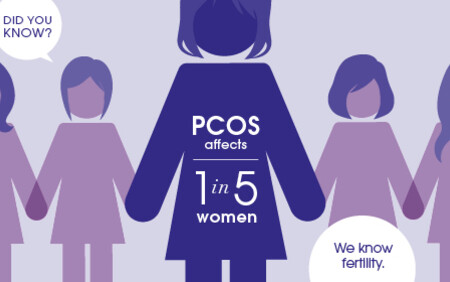
Polycystic Ovary Syndrome (PCOS) & Fertility
Polycystic Ovarian Syndrome (PCOS) is a common condition where the ovaries contain small cysts or follicles that may not grow to maturity or produce eggs capable of being fertilised.
If you are of reproductive age PCOS can affect your fertility and make it more difficult for you to become pregnant naturally.
What is polycystic ovarian syndrome?
Polycystic ovarian syndrome is a hormonal problem. It is commonly diagnosed if you have two out of the three following:
- Hormonal changes, such as acne or unwanted hair growth that may be associated with increased androgen levels
- Irregular periods or ovulation
- The appearance of polycystic ovaries on ultrasound
The term ‘polycystic ovaries’ describes the appearance of the ovaries on an ultrasound scan – they contain many small follicles (12 or more) and the ovaries are often larger than average. If you have polycystic ovaries this does not always mean you will have the syndrome.
As many as 20% of women of reproductive age have ovaries that appear polycystic on ultrasound, with many women having no symptoms or the syndrome. If you have polycystic ovaries but have regular cycles and are ovulating, your fertility is unlikely to be affected.
PCOS Symptoms
The most common symptoms of PCOS include:
- irregular periods (or no periods at all)
- increased facial and body hair growth
- acne
- weight gain
- difficulty falling pregnant
- anxiety and mood symptoms
What causes PCOS?
The causes of PCOS are not well understood however include a genetic predisposition. Other factors such as lifestyle and environmental factors are thought to play a role.
Imbalances in hormonal production affect ovulation, which may occur irregularly or not at all. There may also be a mild increase in testosterone levels, causing darker and thicker hair growth and acne. Hormonal imbalances also cause problems with sugar metabolism, leading to insulin resistance and a higher risk of diabetes if you do fall pregnant or as you get older.
Women with polycystic ovarian syndrome often find they gain weight easily with up to two thirds above the recommended body mass index (BMI). These women often need help to lose weight which can improve their chances of conceiving and reduce their chance of pregnancy complications.
PCOS and irregular periods
A typical menstrual cycle tends to vary from 23 to 35 days. PCOS is commonly associated with irregular menstrual periods, outside of this range. Other symptoms may include a total lack of periods through to heavy prolonged or erratic menstrual bleeding. If this occurs seek medical advice. This may lead to delays in getting pregnancy however may also be associated with abnormalities within the uterus.
Treatment of irregular periods and PCOS can occur in a number of ways:
- Combined oral contraceptive pills
- Weight loss if required
- Taking progesterone tablets
- A hormone containing IUD
How does PCOS affect my fertility?
If you have PCOS it may impact your fertility because
- Your menstrual cycle may be irregular and ovulation erratic
- Increases the risk of anaesthetic and pregnancy complications, mainly associated with weight
- Being significantly overweight can reduce implantation rate, even with normal ovulation and increase the risk of miscarriage (this is not directly caused by PCOS)
All these issues mean the chance of getting pregnant naturally may be lower if you have PCOS and you should seek medical advice.
Diagnosis of PCOS
An ultrasound scan may indicate the presence of many small follicles. Blood tests are required to make the diagnosis and may reveal altered hormonal patterns including slightly increased testosterone levels or normal levels with increased activity.
PCOS fertility treatment
There are a number of treatment options available, which your fertility specialist will discuss with you, including:
- Reducing your body mass index (BMI) if required. For women who are overweight, this is the most important form of medical treatment, and can return ovulatory cycles to normal as well as reduce long-term metabolic risks. Combining healthy eating with moderate exercise is of proven benefit.
- Insulin sensitising agents.
- Ovulation inducing drugs such as Clomiphene.
- Injections of follicle stimulating hormone (FSH).
- Assisted reproduction technologies, including IVF.
Should I see a fertility specialist?
If you are concerned about PCOS affecting your ability to become pregnant, we recommend you see a Melbourne IVF fertility specialist with expertise in PCOS.
If you would like to make an appointment please call us on 1800 111 483 or complete the form below.